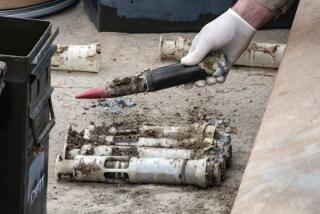EASTERN EUROPE : Rise in Activity on Nuclear Black Market Sparks Fears
- Share via
BERLIN — A flurry of arrests of Eastern European black marketeers trying to sell nuclear material in the West has raised alarm bells of a potential proliferation nightmare.
In the wake of the Soviet Union’s collapse, Western fears initially focused on Moscow’s top atomic scientists and the need to prevent them from selling their skills to dictators, who could then engage in nuclear blackmail.
So far, such brain-drain has not occurred, according to those monitoring the Soviet nuclear industry.
Instead, it is the leakage of nuclear or nuclear-related materials out of the former Soviet Bloc that now worries Western governments.
Evidence of this leakage is strongest in Germany. German federal criminal investigators report that the number of incidents in which smugglers have sold or attempted to sell radioactive material originating in Eastern Europe has jumped from 29 in 1991 to more than 100 so far this year.
“This is the tip of the iceberg,” said Andreas Heinemann-Grueder, a researcher with the Berlin-based Berghof Foundation for Conflict Research, a privately funded think tank that has studied the problem. “What we are witnessing is the search by those in the East to hook into black markets in the West. In the present climate, people (in Russia) are willing to sell anything for money.”
The collapse of communism has left Russia in economic turmoil and its people desperate for hard currency as the ruble rapidly loses value.
Those attempting to track the problem agree that the smuggling does not seem to be centrally organized.
“We’ve monitored a number of cases to see if there is any pattern to the sales, but so far there is none,” commented David Kyd, spokesman for the Vienna-based International Atomic Energy Agency. Nuclear material “seems to be coming from everywhere in the former Soviet Union.”
Recent evidence in Germany points to three facts:
* The illegal trade in nuclear materials is growing.
* The trade appears to be largely in the hands of amateur bandits and petty criminals searching for contacts with Western organized crime or conduits to interested Third World governments.
* Those arrested trying to sell the material are not the organizers; they are often found to be unsure of whom they are to contact and oblivious to the dangers of what they are carrying.
One Polish courier, for example, suffered serious radiation burns after trying to smuggle highly radioactive cesium 137 into Germany in a metal container strapped to his chest.
Since the end of last month, German law officers have seized small containers of cesium and strontium from three Polish nationals in the Ruhr city of Bochum, arrested three other Poles in Frankfurt trying to sell similar material and confiscated 6.6 pounds of uranium from a group of seven suspected smugglers near Munich.
While Munich customs officials believed that the uranium was highly enriched, weapons-grade material, tests later proved otherwise.
A little over two pounds of the material consisted of lightly enriched fuel pellets from a Soviet-built reactor, while the rest was uranium oxide, commonly known in the nuclear industry as “yellow cake,” an intermediate nuclear fuel product freely available on international markets.
Criminal investigators said the men arrested in Munich had demanded the equivalent of $350,000 for the material. The London-based Uranium Institute said the current world price for yellow cake is about $8.25 per pound.
While knowledgeable sources say none of the uranium that has so far surfaced in the West could be directly used in a weapon, the flow of radioactive material out of the former Soviet Union has generated concern about the longer-term proliferation threat.
More to Read
Sign up for Essential California
The most important California stories and recommendations in your inbox every morning.
You may occasionally receive promotional content from the Los Angeles Times.













